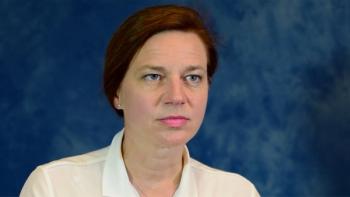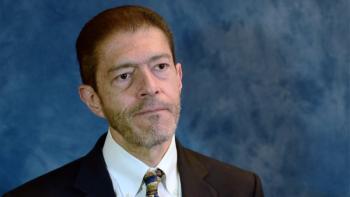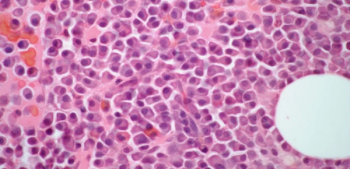
This video examines the targeting of IDH1/IDH2 mutations in patients with relapsed or refractory acute myeloid leukemia.

Your AI-Trained Oncology Knowledge Connection!


This video examines the targeting of IDH1/IDH2 mutations in patients with relapsed or refractory acute myeloid leukemia.

In patients with newly diagnosed multiple myeloma, elotuzumab plus bortezomib, lenalidomide, and dexamethasone was associated with significant toxicity and infections.

The novel IDH2-inhibitor enasidenib was well tolerated and offered durable responses in a phase I trial of relapsed or refractory acute myeloid leukemia patients with an IDH2 mutation.

Cardiovascular adverse events are more than twice as frequent in carfilzomib arms of randomized controlled trials in multiple myeloma, according to a systematic review and meta-analysis of 24 studies.

In this interview we discuss how relapse in multiple myeloma manifests and treatment options for relapsed/refractory patients.

Despite immune-related adverse events, concurrent ibrutinib and anti-CD19 CAR T-cell therapy may improve response rates in patients with chronic lymphocytic leukemia.

The combination of the anti-CD38 monoclonal antibody isatuximab with pomalidomide/dexamethasone had an acceptable and manageable safety profile in patients with relapsed or refractory multiple myeloma.

A fifth course of cytarabine chemotherapy resulted in improved overall and disease-free survival in pediatric patients with low-risk acute myeloid leukemia.

Among high-risk multiple myeloma patients, post-ASCT immunization with the Wilms tumor 1 peptide mixture galinpepimut-S is well tolerated and is associated with promising progression-free survival.

This video presents updated results of two phase III trials in relapsed or refractory multiple myeloma, showing the impact of daratumumab combinations across cytogenetic risk groups.

Adding daratumumab to standard of care is a feasible alternative to autologous stem cell transplantation with standard regimens in multiple myeloma patients.

Researchers are making much-needed progress in developing treatments for patients with three rare malignancies: recurrent and refractory primary central nervous (CNS) system lymphoma, secondary CNS lymphoma, and primary vitreoretinal lymphoma.

CAR T-cell therapy targeting B-cell maturation protein may be a new effective type of immunotherapy treatment for patients with multiple myeloma.

This video highlights results of the BFORE trial, which tested bosutinib vs imatinib in newly diagnosed chronic myeloid leukemia patients.

Prognostic somatic copy number alterations in diffuse large B-cell lymphoma can be detected and monitored noninvasively using ctDNA from patient plasma.

Significant improvements in treatment protocols have reduced the incidence of serious chronic late health effects in survivors of childhood cancer treatment.

Ahead of the 2017 ASCO Annual Meeting, we discuss the discontinuation of TKIs in some chronic myeloid leukemia patients.

The anti-CCR4 antibody mogamulizumab showed promising response rates compared to investigator’s choice in a randomized phase II trial of relapsed/refractory adult T-cell leukemia/lymphoma.

Two studies show that early deep responses with TKIs yield lasting positive outcomes in CML patients, and that dasatinib outperforms imatinib.

Crenolanib, a type I pan FLT3 inhibitor, had activity in a group of patients with FLT3-positive acute myeloid leukemia (AML), including a number of patients with FLT3 D835 mutations.

New research has shown that a higher dose of CTL019 with split dosing was associated with reduced toxicity in adult patients with relapsed, refractory CD19-positive ALL.

Adding bortezomib to bendamustine/rituximab significantly improves complete remission rates in previously untreated high-risk follicular lymphoma, according to a new study.

Researchers were able to identify a subset of patients with smoldering multiple myeloma who have a greater than 80% risk of progressing to myeloma within 2 years.

Monotherapy with the monoclonal antibody isatuximab was effective and well-tolerated in a small study of patients with relapsed and refractory multiple myeloma.

Lenalidomide was able to penetrate ventricular cerebrospinal fluid and was active in a small study of patients with relapsed CNS diffuse large B-cell lymphoma.

A three-drug regimen that includes daratumumab, bortezomib, and dexamethasone may be the new standard of care for patients with relapsed or refractory multiple myeloma.

CPX-351, a liposomal formulation of cytarabine and daunorubicin, improved event-free survival, overall survival, and response compared with a traditional dose of cytarabine/daunorubicin in older patients with high-risk secondary acute myeloid leukemia.

More than half of patients with chronic phase CML who achieved a deep molecular response after nilotinib therapy were able to maintain treatment-free remission.

Maintenance lenalidomide after autologous stem cell transplantation significantly prolonged survival in patients with multiple myeloma, according to results of a meta-analysis.

A study testing the all oral combination of ixazomib, cyclophosphamide, and dexamethasone showed that patients with newly diagnosed multiple myeloma responded well to the experimental treatment regimen.